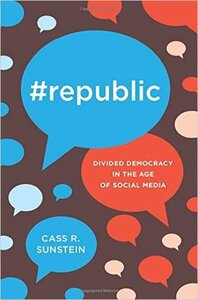Take a photo of a barcode or cover
Impeccably researched, interesting, many important points. Could have been a long-form essay though or maybe an essay series - was essentially a litany of research findings, and tended to circle around and back to the same ideas. The format and repetition both got a bit wearisome.
An excellent read. Sunstein makes great points that are supported by research in several fields. The argument is cohesive and I came away knowing more than I did before.
Interesting in the opening, flopped after the first chapter. Couldn’t bring myself to read the entire thing. My subconscious was telling me to scrap it.
Diversify your news feed. Don’t fall into echo chambers. The end.
Diversify your news feed. Don’t fall into echo chambers. The end.
Oh dear. I've already referenced this in my reviews of several other books either involving or tangential to this writer. Cass Sunstein, who by all accounts is an inexhaustible, irrepressible presence who enjoys writing about damn near everything he can write about, also (perhaps not inexplicably) the most-cited American legal scholar of his day, is also rather ... mediocre. Similar. Repetitive. Having one big idea and repeatedly exploring it works if you're a writer of literary fiction, less so if you're writing about the problems our world is facing today and trying to offer suggestions. Because the same diagnoses, the same prescriptions - they can't work for every single problem! The arguments are certainly solid and believable, the suggestions modest, but so delusionally technocratic that they fail to understand their own implausibility.
Here is a scathing takedown of Sunstein that I wholly endorse: https://newrepublic.com/article/154236/sameness-cass-sunstein
Here is a scathing takedown of Sunstein that I wholly endorse: https://newrepublic.com/article/154236/sameness-cass-sunstein
I like to joke with my Facebook friends that future generations will not appreciate the catastrophe that is the Trump presidency until somebody makes a musical of it. Something like a cross between Phantom of the Opera and Evita. People shouldn't forget that America is a very advanced nation, and the boldest experiment in democracy since the Magna Carta. Cass Sunstein in "#republic" points the spotlight on a very real threat to the American Republic: the tendency of communications services to fragment the audience to the point where literally nobody is talking -- or more importantly -- listening to one another.
And Sunstein puts it so aptly, the continuity of American self-government will have less to do with "the decisions of its founders much less on the world of texts and authorities and ancestors than in the active participation and commitments of its citizens."
There is so much BS in American letters about the founding tenents of the Republic and so little compromise on the floor of the House of Representatives or the Senate. And the populace lets their leaders get away with it. Nothing, it seems, is more important in American society today than winning at all costs.
People live in the enclaves of their electronic worlds. They live and die by free speech, where speech is neither free nor without consequences. Just look at the appalling power of their firearms lobby.
Freedoms devoid of responsibilities.
The responsibility to take care of the citizenry.
The responsibility to care for the planet.
The responsibility to participate as a good citizen on the world stage.
The responsibility to address historical grievances.
This book is good learned debate even as people kvetch about the"eastern elites." Too much Trumpism debases and demeans learned debate. America has such terrific minds at work. Well, if they pack up and leave out of frustration, I hope they come to Canada.
We could use them.
And Sunstein puts it so aptly, the continuity of American self-government will have less to do with "the decisions of its founders much less on the world of texts and authorities and ancestors than in the active participation and commitments of its citizens."
There is so much BS in American letters about the founding tenents of the Republic and so little compromise on the floor of the House of Representatives or the Senate. And the populace lets their leaders get away with it. Nothing, it seems, is more important in American society today than winning at all costs.
People live in the enclaves of their electronic worlds. They live and die by free speech, where speech is neither free nor without consequences. Just look at the appalling power of their firearms lobby.
Freedoms devoid of responsibilities.
The responsibility to take care of the citizenry.
The responsibility to care for the planet.
The responsibility to participate as a good citizen on the world stage.
The responsibility to address historical grievances.
This book is good learned debate even as people kvetch about the"eastern elites." Too much Trumpism debases and demeans learned debate. America has such terrific minds at work. Well, if they pack up and leave out of frustration, I hope they come to Canada.
We could use them.
informative
medium-paced
A timely and encouraging book. An excerpt, to provide a sense of the scope of the book (p. 20):
"POLITICS, FREEDOM, AND FILTERING In the course of the discussion, we will encounter many issues. Each will be treated in some detail, but for the sake of convenience, here is a quick catalog:
• the importance of chance encounters and shared experiences for democratic societies
• the large difference between pure populism, or direct democracy, and a democratic system that attempts to ensure deliberation and reflection as well as accountability
• the intimate relationship between free speech rights and social well-being, which such rights often serve the pervasive risk that discussion among like-minded people will breed excessive confidence, extremism, contempt for others, and sometimes even violence
• the potentially dangerous role of social cascades, including “cybercascades,” in which information, whether true or false, spreads like wildfire
• the enormous potential of the Internet and other communications technologies for promoting freedom in both poor and rich countries
• the utterly implausible nature of the view that free speech is an “absolute”
• the ways in which information provided to any one of us is likely to benefit many of us
• the difference between our role as citizens and our role as consumers
• the inevitability of regulation of speech, and indeed the inevitability of speech regulation benefiting those who most claim to be opposed to “regulation”
• the potentially destructive effects of intense market pressures on both culture and government"
"POLITICS, FREEDOM, AND FILTERING In the course of the discussion, we will encounter many issues. Each will be treated in some detail, but for the sake of convenience, here is a quick catalog:
• the importance of chance encounters and shared experiences for democratic societies
• the large difference between pure populism, or direct democracy, and a democratic system that attempts to ensure deliberation and reflection as well as accountability
• the intimate relationship between free speech rights and social well-being, which such rights often serve the pervasive risk that discussion among like-minded people will breed excessive confidence, extremism, contempt for others, and sometimes even violence
• the potentially dangerous role of social cascades, including “cybercascades,” in which information, whether true or false, spreads like wildfire
• the enormous potential of the Internet and other communications technologies for promoting freedom in both poor and rich countries
• the utterly implausible nature of the view that free speech is an “absolute”
• the ways in which information provided to any one of us is likely to benefit many of us
• the difference between our role as citizens and our role as consumers
• the inevitability of regulation of speech, and indeed the inevitability of speech regulation benefiting those who most claim to be opposed to “regulation”
• the potentially destructive effects of intense market pressures on both culture and government"
informative
slow-paced
Not really that relevant to social media despite the title. Although it's an interesting book, it spends an awful lot of time focusing on the well-documented issues with other media like television news, etc. that it doesn't stay on topic. I felt like it should've been compressed into a long essay rather than a book.


